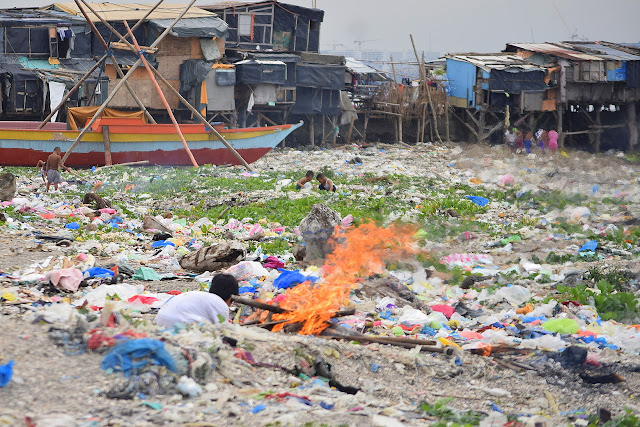The men burn driftwood for charcoal, or turn to Pasig River to fish whatever is left of its polluted waters. Children go on nightdives to haul mussels that cling to foreign barges. At day, they can be found on garbage-ridden shores, scavenging for scraps to sell.
Local and foreign volunteers
Majority of the tourists BASECO receives come from first-world countries like Japan and Germany – all intent on seeing a glimpse of a world starkly different from theirs. Interactions are an integral part of Smokey Tours’ slum tour. Participants are encouraged to come inside the residents’ homes, talk to them, and ask them questions. Some would return home with a new perspective after tours. Some would stay and become volunteers for Smokey Tours.
“That’s exactly what happened to me. I wanted to make a bigger difference,” Ella Daalderop, a Dutch National who’s among Smokey Tours’ small circle of local and foreign volunteers, says. Ella joined one of the slum tours, and in 2017, decided to move permanently to Manila to work on the ground as a volunteer. She is joined by local tour leader and BASECO resident Ate Tes, who serves as our guide for the day.
Ate Tes is one of many residents that Smokey Tours continue to tap and train as guides. They possess a wealth of insider knowledge on how the community works and help raise awareness about slums in the Philippines.
Since funds from tours go to community projects and pay for the training of residents (“sometimes office supplies like pens and paper”, kids Ella), tour leaders are only given allowances during tours. Visitors are free to give them tips.
Asked why she continues to do pro bono work, Ate Tes replied, “I grew up here and see how these tours have helped our community. They do medical missions and educate people. Instead of turning to drugs, our kids can give back as tour leaders and raise awareness that BASECO is just like other communities. It makes me happy and fulfilled even if I have to work long hours and have little money in return,” she intimates in Tagalog.
This sheer optimism isn’t a rarity in slums like BASECO. Born to difficulties, the children here are oblivious to the harsh realities of their world. They would trail tourists and hold their hands. Always smiling, they find joy in the simplest things, like asking for portraits and having strangers show them how they look on camera.
Real dreams and hopes
Slums are stereotyped as dangerous sites for tourists, and as such, they are advised to avoid these areas at all cost. Growing up in a neighborhood where only a block away, a huge slum flourished for decades, I know well about this common perception. Drug peddling, thievery, knife-to-knife brawl – name a hazard and a slum has got it. Or so we think.
In immersion trips in rural slums in Quezon, I’ve come to know better than judge slums for their exterior appearance. My experience with these communities has so far been enlightening and heartwarming. Residents are always happy to share their homes and feed visitors even when food on the table doesn’t suffice for their needs. My day in the urban slum of BASECO was no different.
Like their more privileged counterparts, residents here have hopes. They are fighting to live each day against and with their circumstances. Some of them are fighting for a dream.
 |
|
|
One of them is Kuya Ramil, a porter in Divisoria, who transformed part of his ramshackle home into a community library. Stacks of used books, donated by visitors and NGOs, are piled on a wooden cabinet in his house. Residents are welcome to read and do their homework anytime on Kuya Ramil’s singular table.
Like others in the community, he came from an impoverished family. From his hometown in Mindanao, he traveled to Manila in the the 1980s to job-hunt. “I only finished first grade. I do not know how to write or read. Finding work is hard. I spent weeks sleeping in Luneta before I got here. It’s just me now raising my four kids. My dream is for them to have what I didn’t. I want them and all children here to be educated. That’s why I opened the library,” he shares.
Implication versus intention
The debates will continue. There will always be those who will argue that slum tours are not necessary, especially in a country where there are omnipresent reminders of poverty. “We all know that poverty exists in the Philippines. There’s no need to participate in slum tours to make ourselves aware of their plight,” a comment on one blog reads.
But the questions stand: Is it enough to know to say we really understand? Can we truly understand simply by definition or common knowledge? Should we care to look or should we just look away, fearful of offending?
“That’s why we don’t want to call it a tour. The words “slum” and “tour” have bad implications. We do not take photos and go on our own ways. In fact, we don’t allow photos to be taken unless needed. And you always need to ask permission from the residents in those cases. We would rather call it an experience. Because that’s what it really is. It’s about empowering communities,” says Ella.
Much thanks to Smokey Tours for hosting. You can learn more about Smokey Tours’ slum tour on their website.
























